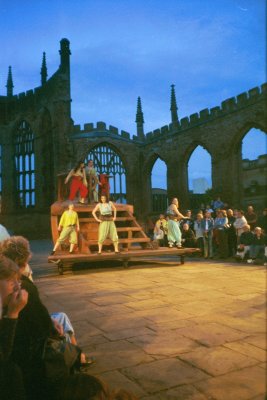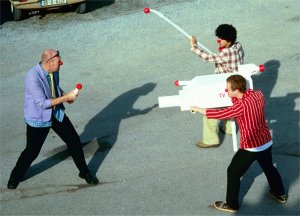The theatre product is the means to an end, not an end in itself. The ultimate aim is the empowerment of each individual, and the community as a whole, through a process of self-discovery. Stressing the importance of participation in this process, however, does not mean that the product is unimportant. It is of the greatest importance. It is the sum total of the effort, creativity and energy of all those involved. All members of the project have a stake in it and a share in its outcome. If it fails, then their share is failure; if it succeeds, their share is success.
It is therefore imperative that the show is of the highest possible quality in relation to the:
* aspirations of the participants
* expectations of the audience
* overall aims of the project
* needs of the area
The measures of success can vary from project to project, but usually have core elements:
* size of audience * press coverage
* enjoyment of audience
* atmosphere of project - if it's too tense, there's no fun
* it happening at all
* the message getting across
* spin-offs post play
* artistic quality of finished product
Access and inclusivity
Communities often in most need of the re- invigorating and empowering qualities of community arts are often those most unlikely to put themselves forward - the `socially excluded' in the latest definition. ACTA interprets this as those on low incomes, people with a disability (including people with learning difficulties and people with mental health needs), older people, people living in areas with poor facilities, single parent families. We target these sections of the community for inclusion in community play projects with a programme of outreach sessions, visits and informal conversations, using the networks of statutory and voluntary organisations in each community. Often we design pilot projects to involve these groups and individuals in familiarand comfortable settings to build confidence and relationships before embarking on the larger project.

County Galway Community Arts Network
Typical projects have included reminiscence theatre which link young people with older people from sheltered accommodation. Elders relate memories to young people who use them as material for dramatic improvisation, creating short plays that are presented back to elders. We also work closely with local authority day centres to set up pilot projects with people with learning difficulties, enabling them to become members of the cast or crew of the community play. In some areas we set up out-of-school theatre groups to involve children and young people in small-scale projects which develop their skills, confidence and commitment prior to the main project.
Pilot projects like this result in a much wider community representation in the community play. The benefits of this process are significant, not only for the development of those individuals' confidence and friendship networks, but for the wider community, where people find themselves working closely with others with whom, in normal circumstances, they would have no contact. It is essential that any space used during a project - for a meeting, rehearsal or performance - is fully accessible. Most of ACTA's shows are played on the floor with the audience raised around it, either in the round, traverse or arena style. People using wheelchairs or with reduced mobility then have no physical obstacle to their taking part. Shows are never performed in theatres, which are notoriously inaccessible, but in school halls, community centres and industrial spaces, where it is possible to create accessible performance spaces.
This focus on inclusivity impacts also on choice of production style. ACTA rarely uses the promenade style that some other companies favour, where the action is on several stages between which the audience moves. We find this form places the audience under duress. It is tiring for just about anyone to stand for two and a half hours. For many members of the audience - children, some older people, wheelchair users and smaller people - the view is limited, the atmosphere claustrophobic and the experience wholly frustrating.
Structure and sustainability
The community play projects initiated by ACTA have a basic structure, usually stretching over a three-year period:

County Galway Community Arts Network.
Pre-project
Contact made between community and ACTA
Agreement to work in partnership
Research into basic issues concerning area
Steering committee formed
Project plan drawn up by ACTA in partnership with steering committee
Funding sought
Research into stakeholders and potential partner organisations
Phase one (once funding found)
Co-ordinator in post
Research into local issues, contact with local groups
Meetings - public and targeted to specific organisations and groups
Pilot projects - small-scale participatory arts projects aimed at socially excluded groups
Consultation process to determine issues, content and theme for play
Devising groups begin to meet
Phase two
Devising group continues to develop script through improvisation, playmaking and writing
Process extended to other community groups e.g. schools, targeted groups
Participants from community engaged in process of playmaking
Script completed
Show rehearsed, set built, costumes made, music written
Show performed
After show meeting to determine future
Phase three
Co-ordinator continues
Steering committee develops its role
Follow-on projects agreed at end of year two are established
Second large-scale project (if identified as a follow-on project)
Smaller-scale community arts projects (if identified as follow-on projects)
Preparation of the steering committee to manage on-going projects (if wished)
ACTA's projects aim to create and maintain sustainable organisations that can continue after the end of the initial project. Making a Difference was set up to explore further the ways to do this.
ACTA applied for and were successful in obtaining funding for the three year development project Making a Difference , which ran from April 1996 to March 1999 Project aims Area profiles Ma